Getting it Wrong: The Medieval Epistemology of Error: Studien und Texte zur Geistesgeschichte des Mittelalters, cartea 63
Autor Evansen Limba Engleză Hardback – 3 noi 1998
The first and second parts explore the organs, powers and faculies of the soul and the ways in which teaching and learning occur.
The third part of the book examines medieval ideas of "common knowledge"and the ways in which individuals can share or fail to share the knowledge human being ought to have. The fourth part considers wisdom and folly, security and incompleteness of knowledge, truth and lies.
Din seria Studien und Texte zur Geistesgeschichte des Mittelalters
- 18%
 Preț: 939.60 lei
Preț: 939.60 lei - 18%
 Preț: 648.78 lei
Preț: 648.78 lei - 18%
 Preț: 680.55 lei
Preț: 680.55 lei - 18%
 Preț: 1129.22 lei
Preț: 1129.22 lei - 18%
 Preț: 1374.36 lei
Preț: 1374.36 lei - 18%
 Preț: 732.03 lei
Preț: 732.03 lei - 18%
 Preț: 1553.02 lei
Preț: 1553.02 lei - 18%
 Preț: 830.60 lei
Preț: 830.60 lei - 18%
 Preț: 1735.94 lei
Preț: 1735.94 lei - 18%
 Preț: 1588.55 lei
Preț: 1588.55 lei - 18%
 Preț: 1061.63 lei
Preț: 1061.63 lei - 18%
 Preț: 737.76 lei
Preț: 737.76 lei - 18%
 Preț: 616.00 lei
Preț: 616.00 lei - 18%
 Preț: 786.42 lei
Preț: 786.42 lei - 18%
 Preț: 956.37 lei
Preț: 956.37 lei - 18%
 Preț: 709.30 lei
Preț: 709.30 lei - 18%
 Preț: 764.05 lei
Preț: 764.05 lei - 25%
 Preț: 827.38 lei
Preț: 827.38 lei - 18%
 Preț: 703.16 lei
Preț: 703.16 lei - 18%
 Preț: 610.43 lei
Preț: 610.43 lei - 18%
 Preț: 636.95 lei
Preț: 636.95 lei - 18%
 Preț: 799.10 lei
Preț: 799.10 lei - 15%
 Preț: 530.26 lei
Preț: 530.26 lei - 18%
 Preț: 649.98 lei
Preț: 649.98 lei - 18%
 Preț: 625.25 lei
Preț: 625.25 lei - 18%
 Preț: 704.36 lei
Preț: 704.36 lei - 18%
 Preț: 532.16 lei
Preț: 532.16 lei - 15%
 Preț: 472.13 lei
Preț: 472.13 lei - 18%
 Preț: 901.58 lei
Preț: 901.58 lei - 18%
 Preț: 1216.44 lei
Preț: 1216.44 lei - 15%
 Preț: 529.42 lei
Preț: 529.42 lei - 18%
 Preț: 550.11 lei
Preț: 550.11 lei - 18%
 Preț: 857.82 lei
Preț: 857.82 lei - 18%
 Preț: 1144.83 lei
Preț: 1144.83 lei - 18%
 Preț: 719.97 lei
Preț: 719.97 lei - 18%
 Preț: 1363.82 lei
Preț: 1363.82 lei - 18%
 Preț: 959.45 lei
Preț: 959.45 lei - 18%
 Preț: 1072.63 lei
Preț: 1072.63 lei - 18%
 Preț: 1351.55 lei
Preț: 1351.55 lei - 18%
 Preț: 957.75 lei
Preț: 957.75 lei - 18%
 Preț: 858.74 lei
Preț: 858.74 lei - 18%
 Preț: 836.65 lei
Preț: 836.65 lei - 18%
 Preț: 858.25 lei
Preț: 858.25 lei - 18%
 Preț: 1142.89 lei
Preț: 1142.89 lei - 18%
 Preț: 881.45 lei
Preț: 881.45 lei - 18%
 Preț: 979.55 lei
Preț: 979.55 lei - 18%
 Preț: 1039.59 lei
Preț: 1039.59 lei - 18%
 Preț: 1196.76 lei
Preț: 1196.76 lei - 18%
 Preț: 838.32 lei
Preț: 838.32 lei - 18%
 Preț: 933.88 lei
Preț: 933.88 lei
Preț: 849.84 lei
Preț vechi: 1036.39 lei
-18% Nou
Puncte Express: 1275
Preț estimativ în valută:
162.64€ • 176.60$ • 136.61£
162.64€ • 176.60$ • 136.61£
Carte indisponibilă temporar
Doresc să fiu notificat când acest titlu va fi disponibil:
Se trimite...
Preluare comenzi: 021 569.72.76
Specificații
ISBN-13: 9789004112407
ISBN-10: 9004112405
Pagini: 222
Dimensiuni: 165 x 244 x 21 mm
Greutate: 0.59 kg
Editura: Brill
Colecția Brill
Seria Studien und Texte zur Geistesgeschichte des Mittelalters
ISBN-10: 9004112405
Pagini: 222
Dimensiuni: 165 x 244 x 21 mm
Greutate: 0.59 kg
Editura: Brill
Colecția Brill
Seria Studien und Texte zur Geistesgeschichte des Mittelalters
Public țintă
Academic libraries, specialists, students in theology, philosophy, history, classics.Notă biografică
Gillian Rosemary Evans, MA, Ph.D., D.Litt. (Oxford), Litt.D. (Cambridge), FRHistS, FRSA, British Academy Research Reader (1986-8), teaches at the University of Cambridge. She is the author of books on Anselm, Augustine on Evil, Philosophy and Theology in the Middle Ages, Problems of Authority in the Reformation Debates.
Cuprins
Preface
Abbreviations
Part One: The assumptions of the system
1. Two poles
2. Parts, organs, powers and faculties of the soul
Part Two: The pursuit of knowledge
1. God's teaching, human learning
2. Creativity
3. Academic processes of teaching and learning
4. Research and curiosity
Part Three: Individuals and collective knowledge
1. The uniqueness of individuals, the particularity of knowledge
2. The commonness of shared knowledge
Part Four: The quality of knowledge
1. Wisdom and folly
2. Security and imcompleteness of knowledge
3. Truth and lies
Conclusion
Sources
Index
Abbreviations
Part One: The assumptions of the system
1. Two poles
2. Parts, organs, powers and faculties of the soul
Part Two: The pursuit of knowledge
1. God's teaching, human learning
2. Creativity
3. Academic processes of teaching and learning
4. Research and curiosity
Part Three: Individuals and collective knowledge
1. The uniqueness of individuals, the particularity of knowledge
2. The commonness of shared knowledge
Part Four: The quality of knowledge
1. Wisdom and folly
2. Security and imcompleteness of knowledge
3. Truth and lies
Conclusion
Sources
Index
